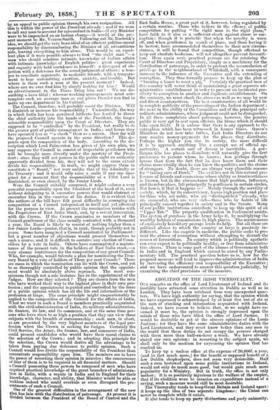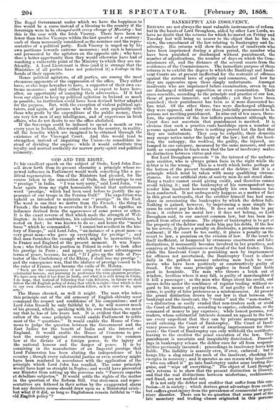ABOLITION OF THE IRISH VICEROYALTY.
Oua remarks on the office of Lord Lieutenant of Ireland and its inutility have attracted some attention in Dublin as well as in London. • They have been reechoed from very unexpected quar- ters. We have high authority for saying, that the opinion which we have expressed is acknowledged by at least five out of six of the men of standing and information acquainted with Ireland. Indeed, we have reason to believe that, ifs we might have as- sumed it must be, the opinion is strongly impressed upon the minds of those who have filled the office of Lord Justice. It would be desirable to get at the sincere opinions of the Lords Justices ; for they have the same administrative duties with the Lord Lieutenant, and they must know better than any men in the world that these duties do not occupy the persons charged with them more than half-an-hour a week. We have already stated our own opinion ; in recurring to the subject again, we shall only be the medium for expressing the opinion that has reached us.
To keep up a useless office at the expense of 20,0007. a year, (and in fact much more,) for the benefit or supposed benefit of a few Dublin shopkeepers, does not seem very defensible. Half such a sum bestowed upon some public institutions in Ireland, would not only do much more good, but would gain much more popularity for a Ministry. But in truth, the office is not only useless ; it is so positively injurious to the welfare of the empire, that if its abolition were to occasion an expenditure instead of a saving, such a measure would still be most desirable. The Viceroyalty tends to keep Great Britain and Ireland apart : it keeps up the idea of two separate kingdoms : the Union can never be complete while it exists. It also tends to keep up party distinctions and party animosity. The Regal Government under which we have the happiness to live would be a curse instead of a blessing to the country if the Sovereign were to be changed with every change of Ministry : but this is the case with the Irish Viceroy. There have been no fewer than twelve Viceroys within the last quarter of a century ; each of them necessarily considered as the nominee and the repre- sentative of a political party. Each Viceroy is urged on by his own partisans towards extreme measures ; and each is harassed and persecuted by the agitators on the opposite side ; who have thus a better opportunity than they would otherwise have had of reaching a vulnerable point of the Ministry to which they are un- friendly. A Lord Lieutenant is thus (and it is strange that the Ministries of all parties have not perceived it) a hostage in the hands of their opponents.
Hence political agitators, of all .parties, are among the most strenuous opponents of the suppression of the office. They either have, or else hope hereafter to have, a supporter of their own ex- treme measures • and they either have, or expect to have here- after, an opportunity of annoying their adversaries. If it had been our object to keep up political agitation in Ireland as much as possible, no institution could have been devised better adapted for the purpose. But, with the exception of violent political agi- tators, and again, of persons who wish to earn popularity with those who profit by the expenditure of the public money, there are very few men of any intelligence, and of experience in Irish affairs, who do not desire to see the Office abolished. If the Sovereign could be induced to spend a month or two every year in Ireland, this would confer on the country, in reality, all the benefits which are imagined to be obtained through the existence of the Viceregal Court. And this would tend to strengthen instead of impairing the Union—to consolidate in- stead of dividing the empire ; while it would substitute true loyalty and mutual cordiality for narrow party-spirit and political animosity.



































 Previous page
Previous page